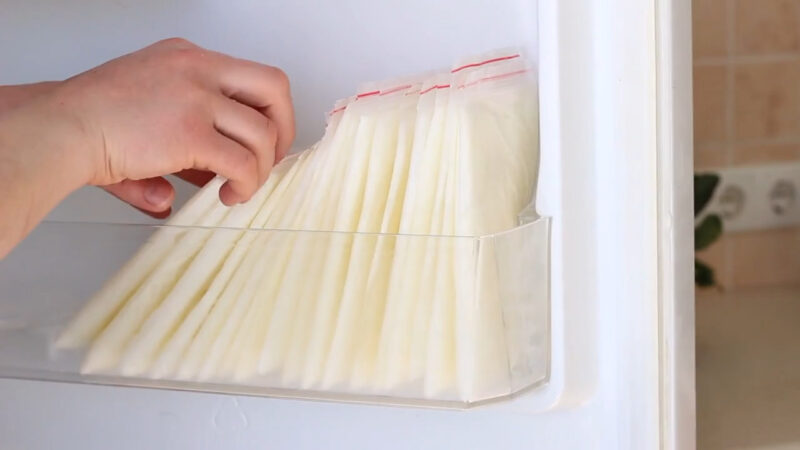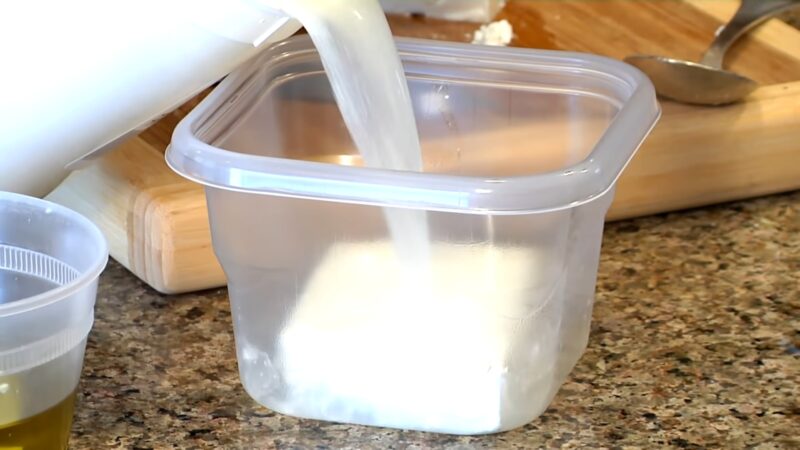Feta cheese, with its tangy flavor and crumbly texture, holds a special place in the hearts of cheese lovers around the world.
Originating from Greece, it’s a dairy delight that has found its way into salads, sandwiches, and numerous dishes, offering a burst of flavor that enhances any meal.
Made traditionally from sheep’s milk, or a mix of sheep’s and goat’s milk, and aged in brine, feta cheese’s unique taste and texture are a result of its meticulous production process.
But once this delightful cheese finds its way into your kitchen, knowing how to store feta cheese properly is key to maintaining its quality and extending its shelf life.
Today, I will provide some tips for feta cheese storage to help you ensure your cheese remains delicious until the very last crumble.
Key Takeaways
- Feta cheese should be stored properly to maintain its quality, either in brine, oil, or wrapped tightly in the fridge, to prevent spoilage and mold growth.
- Unopened feta can last several months in the refrigerator, while opened feta should be consumed within 1 to 2 weeks for best quality.
- Freezing feta cheese is possible but may alter its texture; thawing it slowly in the refrigerator is recommended for best results.
- Storing feta in airtight containers helps keep it from drying out and preserves its flavor and texture.
- Proper handling and hygiene, including using clean utensils and removing any mold immediately, are crucial for extending feta’s shelf life.
The Importance of Proper Storage

Ensuring the freshness and safety of feta cheese involves more than just tossing it into the fridge.
Improper storage can lead to accelerated spoilage, mold growth, and an unwelcome change in texture and taste.
Whether you’re a fan of Greek, Bulgarian, French, or Danish feta, the principles of storing feta cheese effectively remain the same.
What Happens If You Don’t Store Feta Correctly?

Without proper care, feta cheese can dry out, lose its distinctive flavor, or become a breeding ground for unwanted bacteria, which can also happen to both fresh and poorly frozen chicken.
Keeping that in mind, let’s navigate through the dos and don’ts of feta cheese storage.
Feta cheese has been a staple in Greek cuisine for thousands of years. Historical records suggest that the Greeks have been making feta since Homer’s time, with references to the cheese found in the “Odyssey” where Cyclops is mentioned making cheese from sheep’s milk.
How Do You Keep Feta Cheese Fresh?
Storing It Unopened

- In the Refrigerator: An unopened package of feta cheese can comfortably sit in your refrigerator for several months. The key here is to ensure that the refrigerator’s temperature is consistent and below 40°F (4°C).
Once You Open the Package

- In Brine: Storing feta cheese in brine is the most effective way to preserve its freshness and prevent it from drying out. To make a brine, simply dissolve a quarter cup of salt in four cups of water. Place the cheese in this solution and ensure it’s fully submerged.
- In Oil: Another method is storing feta cheese in oil. This method also infuses the cheese with additional flavors, depending on the herbs or spices you choose to include in the oil.
- Wrapped in the Fridge: If brine or oil isn’t an option, wrapping the cheese tightly in plastic wrap and storing it in the refrigerator is a viable alternative. However, this method may not keep the cheese as moist as the brine solution.
Can You Freeze Feta Cheese?
Freezing feta cheese is a debated topic among cheese aficionados. While it’s possible, it may slightly alter the texture of the cheese.
If you choose to freeze feta, wrap it tightly in plastic wrap and then place it in an airtight container or freezer bag.
Thaw it slowly in the refrigerator for the best texture upon use.
Proper Handling and Hygiene
- Always use clean utensils when handling feta cheese to avoid cross-contamination.
- If you notice any mold on the surface of the cheese, remove it immediately to prevent it from spreading.
Storage Options for Long-term Enjoyment
When it comes to preserving the delectable qualities of feta cheese over time, a few more insights can make all the difference.
Let’s explore additional tips and tricks to ensure your feta cheese remains a flavorful companion in your culinary adventures.
Reviving Dry Feta Cheese

Should you find your feta cheese has dried out despite your best efforts, there’s still hope.
Submerge the dried feta in a milk bath overnight in the refrigerator.
This method can help reintroduce moisture, making the cheese more palatable.
The Role of Airtight Containers
Storing feta cheese in airtight containers, especially after it has been opened, is vital in preserving its taste and texture.
Airtight containers prevent air exposure, which can accelerate spoilage and drying out.
They’re also useful for keeping the cheese’s aroma from permeating other foods in your fridge. Besides that, this solution is perfect for other types of cheese, especially Parmesan.
How to Handle Bulk Feta Cheese
If you find yourself with a large quantity of feta cheese, consider dividing it into smaller portions for storage.
This way, you only need to open what you’ll use in the short term, keeping the rest sealed and fresh.
Feta cheese is about 55% to 60% water, which is why it’s often seen stored in brine. This high moisture content contributes to its creamy texture and tangy taste.
Creative Ways to Use Feta Cheese
With proper storage techniques under your belt, let’s not forget the joy of using feta cheese in your cooking.
Beyond the classic Greek salad, feta cheese can add a tangy twist to many dishes.
- Feta and Watermelon Salad: A summer favorite, combining the sweet crunch of watermelon with the salty tang of feta cheese.
- Baked Feta Pasta: A viral sensation, where feta is baked until melty and mixed with pasta and cherry tomatoes for a creamy, comforting dish.
- Feta-Stuffed Peppers: Bell peppers stuffed with a mixture of feta cheese, herbs, and breadcrumbs, then baked until golden.
Preserving Feta Cheese in Recipes
When incorporating feta cheese into your cooking, consider the saltiness it adds to your dishes.
Since feta is stored in brine, it carries a significant amount of salt, which means you may need to adjust the seasoning in your recipes accordingly.
The Health Benefits
Feta cheese is not only tasty but also offers nutritional benefits. It’s a good source of calcium, which is essential for bone health.
Additionally, because it’s made from sheep’s or goat’s milk, it can be a suitable option for those who are sensitive to cow’s milk.
However, moderation is key, as feta is also high in sodium.
Since 2002, feta cheese has been granted PDO status by the European Union. This means that only cheese produced in specific areas of Greece, using traditional methods and from sheep’s and goat’s milk, can be called “feta.”
FAQs
How Long Can Feta Cheese Last in the Fridge?
Once opened, it can last for about 1 to 2 weeks in the refrigerator if stored properly. The key is to keep it submerged in brine or wrapped tightly to prevent exposure to air.
How Do You Know If Feta Cheese Has Gone Bad?
Signs of spoilage include a sour smell, a change in color, or the presence of mold. If you notice any of these signs, it’s best to discard the cheese.
Can I Store Feta Cheese Without Brine?
While storing it without brine is possible, it’s not recommended as the cheese will dry out faster. If you must store it without brine, ensure it’s wrapped tightly and consumed within a few days.
What Are the Best Dishes to Use Feta Cheese In?
Feta cheese is incredibly versatile. It’s a staple in Greek salads, works wonderfully in baked dishes, and adds a tangy kick to sandwiches and pizzas. Its bold flavor ensures it can stand out in any recipe.
Final Words
Feta cheese is a wonderful ingredient that can add a lot of flavor and texture to your meals. But to keep it fresh and tasty, you need to store it the right way.
You can choose to keep your feta in brine, oil, or just in a sealed container in the fridge.
Whatever you prefer, these simple tips will help you preserve your cheese for longer and avoid any spoilage.
Don’t forget, feta cheese is not only delicious, but also versatile. You can use it in salads, sandwiches, pastas, pies, and more.
The secret to making the most of your feta is to take good care of it from the moment you buy it until the moment you eat it. Enjoy!

